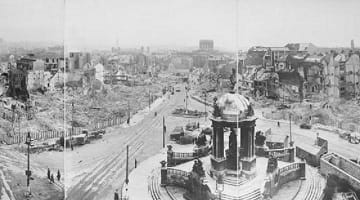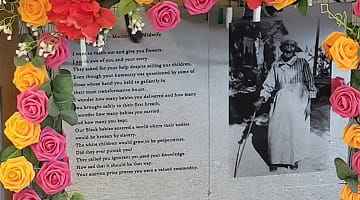2025/26 entry
BA (Hons) History with Foundation Year
Why study History with Foundation Year at Liverpool John Moores University?
- 94% of students surveyed said the teaching staff on our History courses were good at explaining things (National Student Survey 2024)
- Teaching directly informed by internationally-recognised research
- Choose from a wide range of option modules
- Visit a major European city to undertake fieldwork in your second year
- Develops high-level problem-solving and communication skills sought by employers
- Opens up a diverse range of careers from managerial and administrative posts to the media and the military
About your course
The BA (Hons) History with Foundation Year will equip you with all the skills that you need to excel as an undergraduate Historian at LJMU. Having completed the Foundation Year you will join a programme directly informed by internationally-recognised and ground-breaking research.
Teaching on the BA (Hons) History at Liverpool John Moores University is directly informed by internationally-recognised and ground-breaking research.
You don't need any prior knowledge of history but if you have an enquiring mind and an enthusiasm for uncovering the past, this course provides a forum for lively debate and introduces you to political, economic, intellectual and cultural history, as well as the modern history of Britain, Ireland, Europe, the Americas, the Middle East and Eastern Asia. There is also an option to specialise in an area so that you can focus on those aspects of the past that you find most rewarding.
There is an important social side to the course too. Students have an opportunity to join a number of societies and we incorporate 'out of classroom' learning. The International Fieldwork in History level 5 module, where students travel to a Europe city, will allow you to sample a different culture and how this influences the ways in which history is presented in museums. Other modules incorporate visits to sites on Merseyside and beyond.
Foundation Year
The Foundation Year is ideal if you have the interest and ability to study for a degree, but do not have the qualifications to enter directly onto the History honours degree programme yet.
Once you pass the Foundation Year (level 3) you will progress directly onto the first year of the honours degree. If you are a full-time UK student, you will qualify for student financial support for the full duration of your course (subject to eligibility criteria).
"Choosing LJMU was the best decision I ever made. It has changed and supported me more than I could have imagined"
Fees and funding
There are many ways to fund study for home and international students
Fees
The fees quoted above cover registration, tuition, supervision, assessment and examinations as well as:
- library membership with access to printed, multimedia and digital resources
- access to programme-appropriate software
- library and student IT support
- free on-campus wifi via eduroam
Additional costs
Although not all of the following are compulsory/relevant, you should keep in mind the costs of:
- accommodation and living expenditure
- books (should you wish to have your own copies)
- printing, photocopying and stationery
- PC/laptop (should you prefer to purchase your own for independent study and online learning activities)
- mobile phone/tablet (to access online services)
- field trips (travel and activity costs)
- placements (travel expenses and living costs)
- student visas (international students only)
- study abroad opportunities (travel costs, accommodation, visas and immunisations)
- academic conferences (travel costs)
- professional-body membership
- graduation (gown hire etc)
Funding
There are many ways to fund study for home and international students. From loans to International Scholarships and subject-specific funding, you'll find all of the information you need on our specialist funding pages.
Employability
The broad nature of a history degree at LJMU provides a sound basis for developing your communication, research and problem-solving skills and a well-rounded intellect, which are assets in any career.
Graduates are working in occupations ranging from advertising, marketing, museums, arts administration and publishing to industrial, retail, leisure and charitable organisation management, educational administration, accountancy, law, the social and Civil Services and teaching.
Others have completed teacher training PGDE courses at LJMU and other providers or use their skills in other types of teaching, such as English as a second language or adult education. Another option is to continue in education with a masters degree, PhD or vocational course, such as journalism or marketing.
Student Futures - Careers, Employability and Enterprise Service
A wide range of opportunities and support is available to you, within and beyond your course, to ensure our students experience a transformation in their career trajectory. Every undergraduate curriculum includes Future Focus during Level 4, an e-learning resource and workshop designed to help you to develop your talents, passion and purpose.
Every student has access to Careers Zone 24/7, LJMU's suite of online Apps, resources and jobs board via the LJMU Student Futures website. There are opportunities for flexible, paid and part-time work through Unitemps, LJMU's in-house recruitment service, and we also offer fully funded Discovery Internships.
One-to-one careers and employability advice is available via our campus-based Careers Zones and we offer a year-round programme of events, including themed careers and employability workshops, employer events and recruitment fairs. Our Start-Up Hub can help you to grow your enterprise skills and to research, plan and start your own business or become a freelancer.
A suite of learning experiences, services and opportunities is available to final year students to help ensure you leave with a great onward plan. You can access LJMU's Careers, Employability and Start-up Services after you graduate and return for one-to-one support for life.
Go abroad
LJMU aims to make international opportunities available to every student. You may be able to study abroad as part of your degree at one of our 100+ partner universities across the world. You could also complete a work placement or apply for one of our prestigious worldwide internship programmes. If you wanted to go abroad for a shorter amount of time, you could attend one of our 1-4 week long summer schools.
Our Go Citizen Scheme can help with costs towards volunteering, individual projects or unpaid placements anywhere in the world. With all of these opportunities at your feet, why wouldn’t you take up the chance to go abroad?
Find out more about the opportunities we have available via our Instagram @ljmuglobalopps or email us at: goabroad@ljmu.ac.uk.
A life-changing experience
There's so much more to university than just studying for a degree.
News and views
Browse through the latest stories and updates from the University and beyond
What you will study on this degree
Please see guidance below on core and option modules for further information on what you will study.
This course is currently undergoing its scheduled programme review, which may impact the advertised modules. Programme review is a standard part of the university’s approach to quality assurance and enhancement, enabling us to ensure that our courses remain up to date and maintain their high standard and relevancy.
Once the review is completed, this course website page will be updated to reflect any approved changes to the advertised course.
These approved changes will also be communicated to those who apply for the course to ensure they wish to proceed with their application. Where changes to modules are necessary these will be communicated, as appropriate.
Further guidance on modules
Modules are designated core or optional in accordance with professional body requirements, as applicable, and LJMU’s Academic Framework Regulations. Whilst you are required to study core modules, optional modules provide you with an element of choice. Their availability may vary and will be subject to meeting minimum student numbers.
Where changes to modules are necessary these will be communicated as appropriate.
Level 3
Core modules
Preparing for Success: Academic Skills
20 credits
This module provides you with the integrated skills required for academic success. You will develop your skills of creating posters, constructing bibliographies, and sourcing relevant materials. Alongside this you will learn to identify and understand academic writing and referencing techniques. The multi-disciplinary syllabus and assessment tasks will enable you to acquire the academic skills needed for successful transition into Level 4 and the completion of the degree.
Investigating Liverpool
20 credits
This module provides you with the necessary skills to develop a research project on the Liverpool City region from your particular subject perspective. You will explain academic research methods, write a coherent piece of academic work based on an understanding of Liverpool, and locate relevant research to support your project. The module will help you to develop an independent approach to learning.
War: Conflict in the Arts and Humanities
20 credits
This module introduces you to key themes and perspectives in the Arts and Humanities through the cross-disciplinary study of representations of, and responses to, war. It will include regular assessment tasks in order to support a structured approach to learning.
Peace: the Pursuit of Harmony in the Arts and Humanities
20 credits
This module aims to develop your understandings of society at peace through a multi-disciplinary approach in the arts and humanities. The assessment tasks will enable you to focus on a subject area which will facilitate your selection of a pathway for Level 4.
The Spirit of 1914
20 credits
This module will introduce you to the structure and style of academic work and establish an understanding of academic debates about responses to the outbreak of war.
Thirteen Days: the Cuba Missile Crisis in Retrospect
20 credits
This module will broaden your understanding of the Cuba Missile Crisis and wider issues connected with the Cold War. It will provide you with the opportunity to engage with a variety of sources and historical tools to better understand the past.
Level 4
Core modules
Making History
20 credits
The aim of this module is to introduce you to locating, comprehending and analysing secondary and primary sources. This module will give you the experience with multiple staff members in an interactive group environment.
Exploring History
20 credits
Exploring History gives the chance to choose a historical research project and, working in groups, research the material and transfer it into a public presentation, which will be exhibited at the end of the year.
The Faces of Britain
20 credits
This module will set out the basic features of British political, social and cultural history through the nineteenth and twentieth centuries. You will explore the meaning of 'identity', where it comes from, what are its foundations, how is it made and reformed over time and relative to context. This module will also outline the key features of British culture and society to act as a foundation for future studies.
Lion Rampant, Lion Tamed; the Rise and fall of the British Empire
20 credits
The aim of this module is to survey the development and transformation of the British empire from the mid 18th century to the present day. The module will examine themes of 'nation, state and power', 'technology, economy and society' and 'culture, local and identity' with reference to the rise and demise of the British imperial system. It will also examine the concepts of 'structure and agency' and 'change and continuity' in the context of British imperialism and decolonisation.
Modern European History
20 credits
This module will provide you with an understanding of the of importance of the political, cultural, and social aspects of Modern European history. Throughout this module, you will engage in historical debate on a range of topics about myth, memory and identity in Modern European history, critically relating discussion to different national (or otherwise) contexts.
The American Age: People, Politics and Power
20 credits
This module will broaden your understanding of key moments in America's history that have shaped its development as a nation. It will also provide you with the opportunity to engage with a variety of sources and historical tools to better understand America's past.
Level 5
Core modules
Debates in History
20 credits
This module will introduce you to historiographical debates in a range of different national, social, cultural and political contexts. The aim of the module is to equip you with analytical skills that will allow you to understand and contextualize historiographical arguments.
Research Paper
20 credits
You will undertake an in-depth and defined research paper on a topic arising from studies undertaken in another module or modules at Level 5. This will allow you to develop the ability to plan, implement and complete a substantial piece of written work under the guidance of a supervisor who has subject expertise.
Optional Modules
The Soviet Experiment, 1917-1991
20 credits
This module will provide an understanding of the early Soviet state and its relationship to society. You will gain knowledge and skills to understand, identify and critically assess different kinds of source material.
Colonial Africa, 1880-1994
20 credits
The aim of this module is to introduce you to modern African history in order to develop an understanding of colonial rule and decolonisation in Africa.
Gendering the Past
20 credits
This course will introduce you to an exciting and burgeoning area of social and cultural history. We will turn to the expanding areas of material culture studies, sensory studies and gender studies in order to analyse the most intimate areas of peoples lives in the long nineteenth-century
Ireland, 1690-1920
20 credits
This module will equip you with a clear understanding of Irish history from the late seventeenth century to the early twentieth century. The module will also introduce you to contentious periods of Irish history and to familiarize them with the associated historiography.
From Shogun to Showdown: Japan, 1853-1941
20 credits
Between 1853 and the Second World War, Japan was transformed from an isolated feudal country to a great power capable of challenging the great powers of the West. This module explains this emergence by examining the interactions between the natural environment, politics, society and economic development.
Supernatural Britain
20 credits
Within this module, you will examine various supernatural/paranormal phenomena and place them in context. You will be able to develop an understanding of the meanings and interpretation of supernatural/paranormal phenomena to foster an appreciation of the way in which the supernatural/paranormal have been represented in texts and images.
A History of Modern Latin America
20 credits
This module will introduce you to modern Latin American history and allow you to develop an understanding of social and political change in Latin America. This will enable you to think comparatively in geographical and temporal terms.
An International History of the Cold War Era
20 credits
The aim of this module will enable you to understand and articulate different interpretations of the 'Cold War' to develop an understanding of historiographical interpretations of the Cold War and how they have evolved over time. It will also provide an understanding to how the Cold War affected different geographical regions and how it intersected with other major issues, such as decolonization.
Age of Terror 1850-1914
20 credits
This module will allow you to develop knowledge of the phenomenon of international terrorism and the police and intelligence responses to it, in the 19th century. You will be able to reflect on the societal, cultural and political consequences of terrorist attacks and counter-terrorist policing to build focused knowledge of a specific aspect of the 19th century "war on terror".
Gender, Race and Slavery in the United States
20 credits
This module will enable you to understand the development of ideas of slavery, race, gender in the United States. It will also allow you understand historiographical interpretations of slavery in the United States and how they have changed over time.
Tanzimat to Tahrir 2.0: the modern and contemporary history of the Middle East
20 credits
The aim of this module is to consider the modern history of the Middle East from both chronological and thematic perspectives. It will also emphasise the importance of Middle Eastern historiographical perspectives for an understanding of the contemporary Middle East. You will be able to develop further the ability to use a wide range of primary and secondary source material in historical analysis.
International Fieldwork: Modern Germany
20 credits
This module will introduce key themes and debates in modern German history and key historiographical works and scholarly debates in modern German history. You will also be encouraged to critically reflect on the representations of history in public spaces, monuments, exhibitions and museums.
Teaching History
20 credits
The aim of this module is to develop key transferable skills including communication, presentation, practical classroom skills and team working. You will be provided with teaching experience if you are considering teaching as a potential career.
History Works
20 credits
Within this module, you will have the opportunity to acquire a work-based or work-related learning experience. This will help you to identify the links between your degree and employability prospects. LJMU will support you to identify, enhance, and deploy transferable skills and abilities relevant to the workplace.
‘Until I am free, you are not free either’: the U.S. Civil Rights Movement
20 credits
This module will introduce you to the everyday experiences of activists and African Americans during the civil rights movement in the U.S. Throughout the module you will have opportunities to collaborate with peers on an independent study, utilising different types of primary sources, in a presentation format. This module will encourage you challenge established narratives of social movements by engaging with individual perspectives and accounts.
Revolutionaries: International Communism from the Great War to the Cold War
20 credits
The module incorporates the following LJMU Employability Skills:
- Analysis, problem solving and decision making.
- Planning and organisation.
- Creativity and enterprise.
- Intercultural skills.
Level 6
Core modules
Dissertation
40 credits
The aim of the Dissertation is to develop the ability to identify a relevant historical topic and formulate a research proposal designed to explore aspects of that topic to a high level. You will develop the ability to analyse and interpret primary and secondary historical sources in pursuit of a self-defined problem.
Optional Modules
Living with Defeat: France and the Second World War, History and Legacies
20 credits
This module aims to introduce key social, cultural and political contexts and historical debates concerning everyday life in France in the period leading up to, during and following the Second World War. You will be introduced to key historiographical debates such as the legacies of the First World War, the significance of political and social divisions in 1930s France and the reasons for the defeat of 1940.
Brummies, Geordies, Scousers and others
20 credits
The aim of this module is to trace the origins and trajectory of place identities and examine the ways in which different place identities are depicted. You will also explore the similarities and differences between place identities.
We would not know there was a war on. Life on the British Home Front During the Second World War.
20 credits
The aim of this module is to provide an insight into the people's experience of living day-by-day in Britain during the Second World War. You will be introduced to the theoretical approach of cultural history on how people situate themselves within society irrespective of the greater events being played out around them.
Laws of War
20 credits
The aim of this module is to develop an understanding of the historical development of the laws of armed conflict and engage in historical debate on the success and failures of the international humanitarian law regime. You will also understand the relationship between societal change, mass culture and the practice of war.
Soviet Body Politics: Sport, Leisure and Health, 1917-1945
20 credits
The aim of this module is to introduce you to Bolshevik concepts of the body, and how these related to wider social, political, economic and cultural issues. You will be provided with an in-depth understanding of the early Soviet state and society, developing their analytical, critical, and communication skills.
Victorian Cities
20 credits
The aim of this module is to introduce the history of Victorian cities. You will investigate the themes of class and gender in the Victorian city which will enable you to think critically about and historicise urban identities.
Interpreting conflict in post-colonial Africa
20 credits
This module will encourage you to think historically about conflict in post-colonial Africa, paying attention to continuity and change over time. It will also encourage you to think about local, national, regional and global dimensions to so-called 'civil wars' in Africa.
When the Sun Set in the East: End of Empire in Southeast Asia
20 credits
This module will apply historiographical themes in the study of decolonisation to a set of case studies in the Southeast Asia region to examine the programme themes of 'nation, state and power', 'structure and agency' and 'culture, locale and identity' in relation to decolonisation in the developing world, and specifically in Southeast Asia. You will be able to demonstrate variety and diversity in the experience of decolonization, particularly in Southeast Asia.
Celebration and Commemoration in Irish History
20 credits
The aim of this module will enable you to engage in a critical debate about the historiography associated with key events in Irish history. You will engage with different methods of teaching history to different audiences to critically assess the way in which the 1798 Rebellion, the Great Irish Famine and the 1916 Easter Rising have been commemorated and celebrated by later generations.
The Hatred that Never Dies: the Long History of Contemporary Global Antisemitism
20 credits
This module will demonstrate the long historical trajectory of anti-Semitic belief through the systematic study of primary and secondary sources. You will learn how to compare and contrast the developments and mutations of anti-Semitic belief in both European and Middle Eastern historical and contemporary contexts.
Nazi Germany: Dictatorship and Genocide
20 credits
This module provides students with specialized knowledge about the history of Germany during the National Socialist dictatorship, including totalitarian rule and the persecution of political opponents, ethnic and religious minorities. It extensively covers the Holocaust and offers a deep understanding of historiographical debates related to the Third Reich and the Holocaust. The syllabus includes lectures and seminars on various topics, such as the rise of the Nazis, establishment of the Nazi dictatorship, opposition to the Nazi regime, Nazi foreign policy, anti-Jewish policies, the Holocaust, and the aftermath of the Third Reich and the Holocaust.
‘Like a Rolling Stone’: Activism and Revolution in the Long Sixties
20 credits
This module will introduce you to the social activism and change of the 1960s, specifically that which occurred in the U.S. It will inspire you to think critically about the intersections of social change, racial backgrounds, gender, and sexuality in the 1960s. We hope tis will encourage you to challenge established narratives of social movements by engaging with individual perspectives and accounts.
History Works
20 credits
Within this module, you will have the opportunity to acquire a work-based or work-related learning experience. This
will help you to identify the links between your degree and employability prospects. LJMU will support you to
identify, enhance, and deploy transferable skills and abilities relevant to the workplace.
Teaching and work-related learning
Excellent facilities and learning resources
We adopt an active blended learning approach, meaning you will experience a combination of face-to-face and online learning during your time at LJMU. This enables you to experience a rich and diverse learning experience and engage fully with your studies. Our approach ensures that you can easily access support from your personal tutor, either by meeting them on-campus or via a video call to suit your needs.
Teaching is delivered via a combination of lectures and tutorials (some virtual), with additional information available on Canvas (our virtual learning environment) and in the University Libraries. Tutorials are fairly informal and provide an opportunity to further discuss material covered in the lectures. Once you reach your final year, your dissertation offers the chance to work more independently and focus on an area that particularly interests you.
Work-related Learning
The History programme is focused on helping you to develop first-rate skills in communication and critical analysis, which are highly valued by employers. This is why a History degree is a good basis for so many different careers.
Support and guidance
Dedicated personal tutor, plus study skills support
From the moment you begin your studies at LJMU, you will be allocated a personal tutor who will meet with you one-to-one to discuss course-related issues, monitor your progress and help you to put your career plans in place.
Assessment
Assessment varies depending on the modules you choose, but will usually include a combination of exams and coursework.
We acknowledge that all students perform differently depending on the way they are assessed, which is why we use a combination of assessment methods. Coursework can be in the form of essays, portfolios, short written pieces, independent studies and dissertations. There are two types of exam: seen and unseen. Exam questions are available two weeks before the start of seen exams so you have the chance to prepare fully for them.
Your tutors will provide feedback on coursework assessments within 15 days of submission via Canvas, face-to-face or as written comments. We believe constructive feedback is vital in helping you to identify your strengths as well as the areas where you may need to put in more work.
Course tutors
Our staff are committed to the highest standards of teaching and learning
Dr Olivia Saunders
Programme Leader
David specialises in the history of modern Britain with a particular interest in everyday life during the Second World War. The primary focus of his research to date has been in relation to propaganda and how the people of Britain coped with being at war. Beyond academic outputs, he is keen to connect with broader audiences and has most recently been involved in successful collaborations with the National Trust and National Museums Liverpool.
We invest a lot in collaborative learning with our students, challenging them to think in different ways and often completing tasks beyond the norm. This inclusive and communal aspect is a crucial factor in allowing our students to realise their full potential.
Facilities
What you can expect from your School
The School of Humanities and Social Science offers an ideal environment in which to expand your knowledge and horizons. Situated on Mount Pleasant in the new ‘Knowledge Quarter ' of Liverpool, the School is home to five subject areas: English, History, International Relations, Sociology, and Media, Culture & Communication. It has a lively programme of cross-disciplinary research seminars, conferences, visits from international scholars and public events. Research from the School is recognised nationally and worldwide.
Entry requirements
Please choose your qualifications below to view requirements
Grades/points required from qualifications: DDD-CDD (72-80)
Qualification requirements
GCSEs and equivalents
Evidence of Grade 4 or grade C or above in English Language and Mathematics/ Numeracy on their application form. No exceptions considered in lieu of Maths
GCSE Equivalences accepted:
• Key Skills Level 2 in English/Maths
• NVQ Level 2 Functional skills in Maths and English Writing and or Reading
• Skills for Life Level 2 in Numeracy/English
• Higher Diploma in Maths/English
• Northern Ireland Essential Skills Level 2 in Communication or Application of Number
• Wales Essential Skills Level 2 in Communication or Application of Number
A levels
DDD-CDD
BTECs
Extended Diploma: MMP
Access awards
Acceptable on its own and combined with other qualifications
Pass overall with a minimum of 72 points, including relevant subjects
International Baccalaureate
Acceptable on its own and combined with other qualifications From a relevant subject
T levels
Acceptable on its own and combined with other qualifications.
Alternative qualifications considered
Applications are welcomed from mature and non-standard applicants, who will be considered on an individual basis. These applicants may be required to submit an essay and/or attend an interview, and should demonstrate potential and motivation and/or have relevant experience.
International applications will be considered in line with UK qualifications.
International requirements
-
IELTS
6.0 (minimum of 5.5 in each component) or equivalent English language proficiency test.
Further information
-
DBS, Occupational Health requirements
Is a DBS check required?
No
Please Note: All international qualifications are subject to a qualification equivalency check.
Application and selection
Securing your place at LJMU
UCAS is the official application route for our full-time undergraduate courses. Further information on the UCAS application process can be found here https://www.ljmu.ac.uk/study/undergraduate-students/how-to-apply.
The university reserves the right to withdraw or make alterations to a course and facilities if necessary; this may be because such changes are deemed to be beneficial to students, are minor in nature and unlikely to impact negatively upon students or become necessary due to circumstances beyond the control of the university. Where this does happen, the university operates a policy of consultation, advice and support to all enrolled students affected by the proposed change to their course or module.
Further information on the terms and conditions of any offer made, our admissions policy and the complaints and appeals process.











